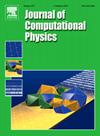用于学习奇摄动系统的快慢神经网络
IF 3.8
2区 物理与天体物理
Q2 COMPUTER SCIENCE, INTERDISCIPLINARY APPLICATIONS
引用次数: 0
摘要
奇摄动动力系统在气候动力学和等离子体物理学中起着至关重要的作用。解决这些系统的一个强大而著名的工具是Fenichel范式,它通过转换显着简化了慢流形附近的快速动力学。然而,这种范式在传统的数值算法中很难实现。在这项工作中,我们探索了一种通过结构保留机器学习实现它的替代方法。具体来说,提出了一种快慢神经网络(FSNN)来学习具有耗散快时间尺度动力学的奇异摄动系统的数据驱动模型。我们的方法强制存在一个可训练的,吸引不变的慢流形作为硬约束。慢流形的封闭形式表示实现了慢时间尺度上的高效集成,并显著提高了超出训练数据的预测精度。我们用Grad力矩系统、两尺度Lorenz96方程和模拟电子辐射反应的Abraham-Lorentz动力学等例子来证明FSNN。本文章由计算机程序翻译,如有差异,请以英文原文为准。
Fast-slow neural networks for learning singularly perturbed dynamical systems
Singularly perturbed dynamical systems play a crucial role in climate dynamics and plasma physics. A powerful and well-known tool to address these systems is the Fenichel normal form, which significantly simplifies fast dynamics near slow manifolds through a transformation. However, this normal form is difficult to realize in conventional numerical algorithms. In this work, we explore an alternative way of realizing it through structure-preserving machine learning. Specifically, a fast-slow neural network (FSNN) is proposed for learning data-driven models of singularly perturbed dynamical systems with dissipative fast timescale dynamics. Our method enforces the existence of a trainable, attracting invariant slow manifold as a hard constraint. Closed-form representation of the slow manifold enables efficient integration on the slow time scale and significantly improves prediction accuracy beyond the training data. We demonstrate the FSNN on examples including the Grad moment system, two-scale Lorenz96 equations, and Abraham-Lorentz dynamics modeling radiation reaction of electrons.
求助全文
通过发布文献求助,成功后即可免费获取论文全文。
去求助
来源期刊

Journal of Computational Physics
物理-计算机:跨学科应用
CiteScore
7.60
自引率
14.60%
发文量
763
审稿时长
5.8 months
期刊介绍:
Journal of Computational Physics thoroughly treats the computational aspects of physical problems, presenting techniques for the numerical solution of mathematical equations arising in all areas of physics. The journal seeks to emphasize methods that cross disciplinary boundaries.
The Journal of Computational Physics also publishes short notes of 4 pages or less (including figures, tables, and references but excluding title pages). Letters to the Editor commenting on articles already published in this Journal will also be considered. Neither notes nor letters should have an abstract.
 求助内容:
求助内容: 应助结果提醒方式:
应助结果提醒方式:


